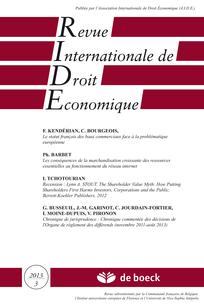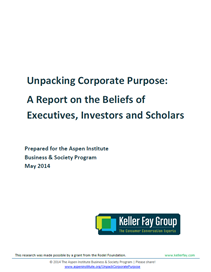actualités internationales autres publications Gouvernance Normes d'encadrement objectifs de l'entreprise Publications
Bien distinguer le purpose, la mission, la valeur et la vision
Ivan Tchotourian 22 mars 2021 Ivan Tchotourian
L’University of Oxford, l’University of California, Berkeley, BrightHouse, la British Academy, Federated Hermes EOS et Wachtell, Lipton, Rosen & Katz ont publié un excellent rapport dont je recommande fortement la lecture : « Enacting Purpose within the Modern Corporation: A Framework for Boards of Directors ». En plus de revenir sur le purpose, ce rapport offre une distinction entre des notions souvent confondues…
Extrait
- « Purpose. Purpose States « Why » an Organization Exists: As Professor Colin Mayer, one of our co-chairs puts it, “the purpose of business is to solve the problems of people and planet profitably, and not profit from causing problems”. This statement deliberately leaves open the question of the specific purpose of each organisation, but does deliberately and carefully demand a reason for existence alongside the pursuit of profit. Purpose sets out the reasons why the organisation conducts its various activities, articulating what societal challenge, need or benefit the organisation seeks to address. This sets it apart from the three other important concepts for organisations below. Once this purpose has been debated and formally agreed, the board should not only publish it but also ensure that its internal governance and external reporting evaluate its activities and the outcomes generated against its stated purpose.
- « Values. Values Describe « How » the Organization Behaves : These are often short and punchy bullet points, detailing specific expectations and principles of interaction within the organisation’s internal or external operating environment. More importantly they should be a call to action. These values should inform and guide the specific day to day behaviours and decisions taken by every member of the organisation. They should be articulated in a way that the intent is clearly understood, and the board of directors should ensure that the organisational culture embraces these values and enables them to be put into practice by every member of the organisation. Boards of directors also need to ensure that employees are empowered to ensure that key suppliers act in compliance with the organization’s stated values.
- « Mission. Mission Sets Out « What » the Organisation Does: It captures the day to day activities of the organisation, defining quite literally what business it is in. It is directly linked to the strategy of the organisation and is underpinned by the values deployed to deliver the mission. It is very practical and descriptive in nature. Mission therefore sets out specifically and practically what the organisation aims to do in pursuit of its stated purpose. Mission statements provide an opportunity for boards of directors to set out what they specifically intend to deliver to each of the organisation’s different key stakeholder groups.
- « Vision. Vision Describes « Where » the Organisation Intends to Have Impact: It describes the outcome that the organisation wants to see from the successful delivery of its stated purpose. Put simply, vision captures what success looks like. By its nature, vision statements are aspirational, large scale and usually long-term.
À la prochaine…
autres publications Gouvernance objectifs de l'entreprise Valeur actionnariale vs. sociétale
Reclaiming the idea of shareholder value
Ivan Tchotourian 13 juillet 2016
Michael J. Mauboussin et Alfred Rappaport ont publié il y a quelques jours un article dans la Harvard Business Review qui revient sur la valeur actionnariale : « Reclaiming the Idea of Shareholder Value ». Les auteurs insistent sur l’importance de définir et de communiquer clairement l’objectif des entreprises.
Corporate governance issues are constantly in the headlines. Activist investors challenge management strategies. Investors and others ask why companies binge on buybacks while skimping on value-creating investment opportunities. But discussions of corporate governance invariably miss the real problem: most public companies have extensive governance procedures but no governing objective. As a result, there is no sound basis for stakeholders, including shareholders, to assess the performance of the company and its executives.
Corporate governance is a system of checks and balances that a company designs to ensure that it faithfully serves its governing objective. The governing objective is the cornerstone upon which the organization builds its culture, communications, and choices about how it allocates capital. Think of it as a clear statement of what a company is fundamentally trying to achieve.
Today there are two camps that aim to define the idea of governing objective, but neither is effective. The first believes the company’s goal is to maximize shareholder value. Countries that operate under common law, including the United States and the United Kingdom, lean in this direction.
The second advocates that the company balance the interests of all stakeholders. Countries that operate under civil law, including France, Germany, and Japan, tend to be in this camp.
À la prochaine…
Ivan Tchotourian
autres publications Normes d'encadrement objectifs de l'entreprise Valeur actionnariale vs. sociétale
La valeur actionnariale au rancart !
Ivan Tchotourian 31 mai 2016
Belle tribune de la professeure Lynn A Stout : « The Myth of Maximizing Shareholder Value » (OpenEdNew, 23 mai 2016).
By the end of the 20th century, a broad consensus had emerged in the Anglo-American business world that corporations should be governed according to the philosophy often called shareholder primacy. Shareholder primacy theory taught that corporations were owned by their shareholders; that directors and executives should do what the company’s owners/shareholders wanted them to do; and that what shareholders generally wanted managers to do was to maximize « shareholder value, » measured by share price. Today this consensus is crumbling. As just one example, in the past year no fewer than three prominent New York Times columnists have published articles questioning shareholder value thinking. Shareholder primacy theory is suffering a crisis of confidence. This is happening in large part because it is becoming clear that shareholder value thinking doesn’t seem to work, even for most shareholders.
Je vous laisse lire la suite…
Pour rappel, j’avais eu l’occasion de faire une recension du très bel ouvrage de Lynn A Stout dans la Revue international de droit économique – 2013/3 ((t. XXVII)) – : ici.
Lynn A. STOUT, The Shareholder Value Myth: How Putting Shareholders First Harms Investors, Corporations and the Public, Berrett-Koehler Publishers, 2012
1 – Un sujet d’une grande actualité
2 – Remise en cause de la norme de primauté actionnariale
3 – Les actionnaires d’aujourd’hui
4 – Mise en perspective de l’ouvrage
À la prochaine…
Ivan Tchotourian
autres publications Nouvelles diverses objectifs de l'entreprise
RSE et transparence : est-ce opportun ?
Ivan Tchotourian 5 mai 2016
Le quotidien Le Monde vient de publier un article de Mme Stéphanie Goujon (« Il faut « favoriser la diffusion du retour social sur investissement auprès des entreprises comme des associations » ») qui revient sur l’importance d’évaluer la création de valeur sociétale et l’utilité de développer un nouvel indicateur pertinent, moderne et juste : le retour social sur investissement (Social Return on Investment, SROI). L’auteure y aborde le dernier rapport de France Stratégie sur le lien entre RSE et performance d’entreprise.
Les entreprises peinent véritablement à calculer le retour sur investissement des actions RSE – le fameux ROI (« return on investment »), Graal de toute entreprise. L’absence de liaison directe entre RSE et ROI de la responsabilité sociale, sociétale et environnementale conduit même certaines entreprises à penser que leur démarche RSE n’a aucun impact sur leurs performances économiques et financières… Pourtant une récente étude de France Stratégie montre qu’il existe un écart de performance économique de 13 % au bénéfice des entreprises ayant adopté une démarche RSE.
À la prochaine…
Ivan Tchotourian
autres publications objectifs de l'entreprise
Proposition de The Aspen Institute contre le court-terme
Ivan Tchotourian 3 septembre 2015
The Aspen Institute a publié en mai 2014 un document intitulé « Unpacking Corporate Purpose: A Report on the Beliefs of Executives, Investors and Scholars » qui recense des entrevues et dans lequel il fait des propositions percutantes pour contrer le court-termisme. Quelles sont ces propositions ?
- Alter incentive arrangements,particularly compensation packages, and gear them for the longer term
- Fully investigate a way to monetize the matters that are currently regarded as “abstract” in order to compete for attention or complement concrete metrics like the stock price
- Alter or simplify the tax code
- Promote the partnership between a clear and formal declaration of mission and a thorough alignment with that mission
- Foster%ransparency – by demanding better communication skills among corporate managers to counter the pernicious effects of short-term thinkers
- Create better balance in the corporation’s decision making structure, particularly by expanding the influence of employees, whose well-being tends to be linked to long-term planning and success.
- Demonstrate a greater commitment to attracting and training strong leaders
- Increase the visibility and exploit the power of research that measures and évaluates corporate reputation.
- Explore the possibilities in new ways of forming corporations
- Offer different classifications of stock that reflect the extent to which they represent long- or short-term orientations by the shareholders
Most commentary on corporate purpose and corporate governance is couched in narrow assumptions about what corporate exécutives and investors believe. Rather than assume, we have commissioned independent research to ask executives, investors and scholars to unpack what they really believe about the purpose of the corporation. Twenty-eight one-hour interviews were conducted in late 2013 and early 2014 and the results may surprise you.
À la prochaine…
Ivan Tchotourian

